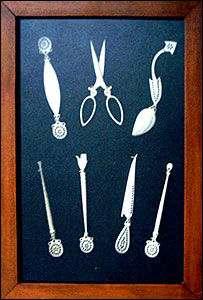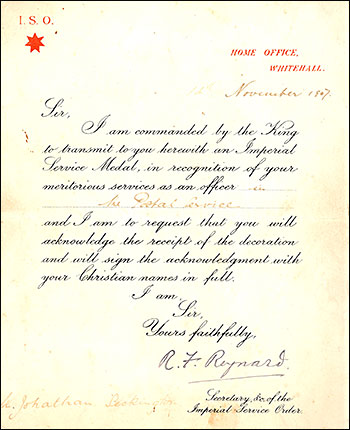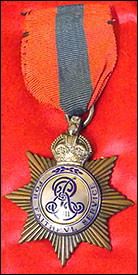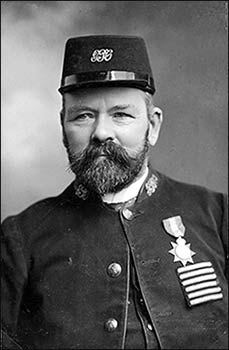|
||||||||||
| The Rushden Argus, 29th November 1907, transcribed by Kay Collins |
||||||||||
|
An Honoured Townsman
|
||||||||||
|
Compares the Past with the Present.
|
||||||||||
|
It was on March 2nd, 1873, Mr. Seckington informed our scribe, that he commenced his duty at Higham Ferrers Post Office, and at that time he had to deliver the whole of the letters in Rushden and Wymington twice a day. The highest total for one day in the week for that period for the two places combined was 122. The only streets in Rushden in 1873 were High-street, Duke-street, Church-lane, now called Newton-road and Church-street, and Little-street. In Rectory-road and Park-road, formerly called the Back-way, the only houses were Margett's Cottages at the top of Drawbridge's-yard, the Rectory, and six cottages in what is now called Park-road, which still remain. The house on the eastern side of the church was built originally for the parish clerk. It was, however, let to Mr. Callaway, a draper, and then to a pawnbroker. The clerk, it might be here observed, recently went back again to the house. ''On the other side of the church," said Mr. Seckington, "Mr. Treen, as good an old landlord as ever lived, kept the Wheatsheaf Hotel. He afterwards left the town, but returned some time ago, and is now living in North Cottage, North-street." "There were only two houses on the Wellingborough-road. One was Bloswick Farm, now occupied by Mr. George Wilmott, and the house adjoining the Windmill. Where the Windmill Club now stands stood the old Windmill in full working. "The houses I have mentioned," continued Mr. Seckington, "were outside the radius of delivery. It was one of the postal regulations that if a house was over 70 yards from the street it was not included in the delivery, and people had to fetch their letters from the Post Office, or appoint a place where their letters might be left. The Post Office then was where Mr. Tomlinson, the tailor, has his business. The late Mr. John Groom was at that time postmaster at Higham Ferrers, and Mr. Charles Hewitt at Rushden." Speaking of the appearance of the town when he commenced duty, Mr. Seckington said Mr. Robinson's newspaper shop was a typical piece of old Rushden. Where Mr. Maudlin's chemist's shop stands formerly stood an old homestead with fields at the back, where Church-street, and Alfred-street are now made. There was a row of thatched cottages turning down from the homestead, and one of the cottages was afterwards turned into the Primitive Methodist meeting-house. "There used to be, and not without just cause, a lot of grumbling over the late arrival of the letters, both at Higham and Rushden. A portion of the letters used to come by rail and a portion by road. The letters by rail were due in at 5 a.m. at Higham Ferrers and the road mail at 6 a.m. The former came by goods train from Northampton by the London and North-Western Railway, and if there was much traffic at Northampton the mails would be very late. At that time there were two tollgates at Higham, one being across the road leading from Rushden into Higham and the other was close by across the Wellingborough-road. Order was maintained in Rushden by the parish constable, who was none other than Mr. George Perkins, who passed away last summer. If there was a row on "George" was on the scene, and if he could not get order otherwise he would get it by means of his staff. " "In the early 'eighties Rushden began to grow by leaps and bounds. When I started my duties," said Mr. Seckington, "practically the only boot manufacturers in Rushden were Mr. John Cave, Messrs. B. Denton and Son, Mr. Wm. Claridge, and Mr. Wm. Colson. I used to leave Higham at 6 a.m., and after delivering the letters in Rushden I had to go on to Wymington, getting there about 9 o'clock. I returned about 10 and then I had the same journey to do again at mid-day. As Rushden grew, I had to be relieved of one of the Wymington journeys, and later on the other journey was taken from me and I had to devote all my time to Rushden. Then as the town kept growing I had one man to help me, then two, and they were increased until I had six. "Contrast the old conditions with the splendid postal arrangements of to-day,'' continued Mr. Seckington. "There is the new magnificent Post Office, with postmaster, indoor staff of five clerks, including two lady clerks, four established postmen and six auxiliaries, two men for delivering parcels and three telegraph messengers. Rushden has now three deliveries a day and twelve despatches. There are four sub-offices—Higham-road, High-street South, Newton-road, and Wellingborough-road—and a large number of wall-boxes and pillar boxes. The changes have been truly wonderful. "Many new handsome buildings' have been erected during my 34 years' post office career. Amongst them are three banks, the Police Station, the Fire Station, Council Buildings, Free Library, new Post Office, Coffee Tavern, Victoria Hotel, and the gasworks; the almshouses on the Wellingborough-road, built to the memory of Mr. Maitland Sartoris; new schools in Newton-road, Moor-road, and Hayway; new brickworks; Independent Wesleyan, Park-road Baptist, Park-road Wesleyan, Primitive Methodist, and Zion Chapels, the Wellingborough-road Mission, and St. Peter's Church; the Conservative, Athletic, Trades Union, Working Men's, Windmill, and Town Band Clubs.'
|
||||||||||
Mr. Seckington has been the recipient of the heartiest congratulations from all quarters on the recognition he has received at the hands of his Majesty, and numerous friends have also called upon him to inspect the medal which now daily adorns his breast and which we trust he will live to wear for many years. |
||||||||||
|
|
||||||||||
|
|
||||||||||
|
|



